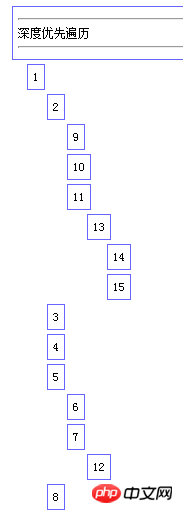Maison >développement back-end >tutoriel php >Compétences en matière d'implémentation de l'arbre non ordonné php
Compétences en matière d'implémentation de l'arbre non ordonné php
- 墨辰丷original
- 2018-06-08 15:17:481586parcourir
Cet article présente principalement les compétences d'implémentation de l'arbre non ordonné PHP. Les amis intéressés peuvent s'y référer. J'espère qu'il sera utile à tout le monde.
L'exemple de cet article décrit la méthode d'implémentation de l'arbre non ordonné php, comme suit :
L'effet d'exécution est illustré dans la figure ci-dessous :

Code php Comme suit :
<?php
/*
用php写的无序树
*/
class unorderedTree{
// 节点id计数器
protected $nodeId=0;
// 树的深度
protected $depth=0;
// 树的节点数,
protected $nodesCount=0;
// 树的度 @todo: 使其发挥作用
public $degree=" to be implent";
// 根节点id
// 由于树有多种从根节点开始操作,不想每次遍历树到顶找root,用一个变量始终指向根节点
protected $rootid=null;
// 子节点集合, k-v 为 nodeid=>(stdclass)node
// 一些树的实现常常是采用节点和树同一class,这里节点是使用 stdclass{ data, parent, id , childrenIds} ,因我认为节点和树应为两种对象,且stdclass要轻于树的class
// 节点格式说明: $this->nodes[nodeId] = new stdclass{ id ,parentId, childrenIds, data }
// id: 节点id
// parentId: 节点父节点id
// childrenIds: 子节点的id 不想每次遍历树确定层次关系
// 注意: 节点中, #只保存其自身数据和其子节点id的集合#, 子节点的数据通过从树 $tree->nodes[ $node->childrenIds[a_child_id] ] 访问
// data: 节点中包含的数据,如节点名称等属性数据
protected $nodes=array();
// 用户自定义访问节点
protected $userVisitFunction=null;
/* 分组: 类的基本函数 */
// @todo: 构造树
public function __construct(){
}
// @todo: 销毁树
public function __destruct(){
unset($this->nodes) ;
}
//------------ 获取数据类函数---------------
// 获取树的深度,
public function getTreeDepth(){
return $this->depth;
}
// 获取树的节点数目
public function getCount(){
return $this->NodesCount;
}
// 获取树的度
public function getDegree(){
// @todo: 获取树的度(因为对度暂时没什么需要就不实现了 )
return $this->degree;
}
//获取指定节点
public function getNode($nodeId){
if(isset($this->Nodes[$nodeId])){
return $this->Nodes[$nodeId];
}
else{
return false;
}
}
// 获取最新id
public function getId(){
return $this->nodeId;
}
//获取指定节点高度
public function getNodeHeight($nodeId){
if( array_key_exists($nodeId, $this->nodes) ){
// 此节点已在树里,高度至少为1,每找到一个父节点+1
$height=1;
// 记录此树中已经访问过的节点, 用于防止节点构造时互相parent导致此函数死循环且及时结束查找
$visitedNodesIds=array();
// 记录当前操作节点的id
$cid=$nodeId;
// 当前节点的父节点必须存在于此树中
// 不用递归
while( isset($cid) ) {
if( !in_array($cid,$visitedNodesIds ) ){
if( $this->rootid===$cid){ //到顶,返回
return $height;
}
$visitedNodesIds[]=$cid;
$cid= $this->nodes[ $cid ]->parentId;
$height++;
}
else{
return false;
}
}
return false;
}
else{
return false;
}
}
//获取根节点
public function getRoot(){
return (!is_null($this->rootid) ) && $this->nodes[$this->rootid];
}
//获取指定节点和其所有子节点构成的数组
//这是用于获取子树的一个关键基础操作
public function getSubNodes($nodeId){
if(isset($this->nodes[$nodeId])){
$result=array();
$toVisitNodeIds=array();
$toVisitedNodeIds[]=$nodeId;
$result[]=$this->nodes[$nodeId]->id;
array_shift($toVisitedNodeIds);
$toVisitedNodeIds=array_merge( $toVisitedNodeIds, $this->nodes[$nodeId]->childrenIds);
while(!empty($toVisitedNodeIds)){
$toVisitNodeId=array_shift($toVisitedNodeIds);
$result[]=$this->nodes[$toVisitNodeId]->id;
$toVisitedNodeIds=array_merge( $toVisitedNodeIds, $this->nodes[$toVisitNodeId]->childrenIds);
}
return $result ;
}
else{
return false;
}
}
//@todo: 获取由指定节点和其所有子节点构建的子树
public function getSubTree($nodeid){
}
//---------------- 数据更新 -----------------
public function setId($nodeId){
$this->nodeId=$nodeId;
return $this;
}
// 创建不重复的(树中未被使用的) 新id
public function seekId(){
$this->nodeId++;
return $this->nodeId;
}
public function setVisitFunction($userFunction){
$this->userVisitFunction=$userFunction;
}
//插入子节点,默认为插在根节点下
public function insertNode($parent_id=null , $data=null){
//注意node不是class tree
$node = new stdclass;
$node->data = $data;
//树的节点数增加
$this->nodeCount++;
// 分配节点id
$this->seekId();
$node->id =$this->getId();
//插入根节点
if( (is_null($parent_id)) && is_null($this->rootid)){
$node->parentId = null;
$node->childrenIds = array();
$this->depth=1;
$this->rootid=$node->id;
$this->nodes [$node->id]=$node;
return $this;
}
elseif( isset($this->nodes[$parent_id]) || is_null($parent_id) ){
// 插在此树已有节点下
if(is_null($parent_id)){
$parent_id=$this->rootid;
}
$node->parentId = $parent_id;
$node->childrenIds = array();
//更新树的最大深度
$depth=$this->getNodeHeight($parent_id);
$this->depth=max($depth+1, $this->depth);
$this->nodes[$parent_id]->childrenIds []= $node->id;
$this->nodes [$node->id]=$node;
return $this;
}
else{
return $this;
}
}
//insert node 的别名
public function append($parent_id=null , $data=null){
return $this->insertNode($parent_id,$data);
}
// --------------- 数据访问 -----
//广度优先遍历节点的别名, 全名太长了
public function b($nodeId=null){
return $this->breadthTraversal($nodeId);
}
// 广度优先遍历节点
public function breadthTraversal($nodeId=null){
if(is_null($this->rootid)){
die("此树为空树,不可访问");
}
else{
//全部遍历
if(is_null($nodeId) || ( $this->rootid===$nodeId) ){
$nodeId=$this->rootid;
}
$toVisitNodeIds=array();
$toVisitedNodeIds[]=$nodeId;
$this->visit( $this->nodes[$nodeId]);
array_shift($toVisitedNodeIds);
$toVisitedNodeIds=array_merge( $toVisitedNodeIds, $this->nodes[$nodeId]->childrenIds);
while(!empty($toVisitedNodeIds)){
$toVisitNodeId=array_shift($toVisitedNodeIds);
$this->visit( $this->nodes[$toVisitNodeId]);
$toVisitedNodeIds=array_merge( $toVisitedNodeIds, $this->nodes[$toVisitNodeId]->childrenIds);
}
}
return $this;
}
//深度优先的别名
public function d($nodeId=null){
return $this->depthTraversall($nodeId);
}
// 深度优先遍历
// 和广度优先的不同实现只在于array_merge的顺序不同而已 ( php array 忒好用啊忒好用 )
public function depthTraversall($nodeId=null){
if(is_null($this->rootid)){
die("此树为空树,不可访问");
}
else{
//全部遍历
if(is_null($nodeId)){
$nodeId=$this->rootid;
}
$toVisitNodeIds=array();
$toVisitedNodeIds[]=$nodeId;
$this->visit( $this->nodes[$nodeId]);
array_shift($toVisitedNodeIds);
$toVisitedNodeIds=array_merge( $this->nodes[$nodeId]->childrenIds, $toVisitedNodeIds );
while(!empty($toVisitedNodeIds)){
$toVisitNodeId=array_shift($toVisitedNodeIds);
$this->visit( $this->nodes[$toVisitNodeId]);
$toVisitedNodeIds=array_merge( $this->nodes[$toVisitNodeId]->childrenIds, $toVisitedNodeIds );
}
}
return $this;
}
//访问单个节点
public function visit($node){
if(is_null($this->userVisitFunction )){
return $node->id;
}
else{
return call_user_func($this->userVisitFunction,$node,$this);
}
}
}
?>Résumé : Ce qui précède est l'intégralité du contenu de cet article, j'espère qu'il sera utile à l'étude de chacun.
Recommandations associées :
Connaissance de base et application des modèles de conception PHP
Définition et méthode de génération de PHP code-barres
Plusieurs méthodes pour php pour déterminer et obtenir les extensions de fichiers
Ce qui précède est le contenu détaillé de. pour plus d'informations, suivez d'autres articles connexes sur le site Web de PHP en chinois!
Articles Liés
Voir plus- Comment utiliser cURL pour implémenter les requêtes Get et Post en PHP
- Comment utiliser cURL pour implémenter les requêtes Get et Post en PHP
- Comment utiliser cURL pour implémenter les requêtes Get et Post en PHP
- Comment utiliser cURL pour implémenter les requêtes Get et Post en PHP
- Tous les symboles d'expression dans les expressions régulières (résumé)

